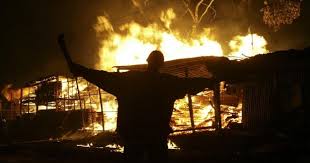By Salwa mahmoud
Mbwajumwali has schools, classrooms, desks, and books that promise knowledge and hope, but they sit mostly empty. Education is meant to be the heartbeat of the village, the bridge from poverty to opportunity, and the tool that shapes dreams into reality. It is supposed to teach children to think, to plan, and to lead. Yet here in Faza Ward, Lamu East, that promise is fading. Schools exist, but hope is slipping through the fingers of a generation that should have been the village’s future.
The families of Mbwajumwali are trapped in a daily struggle. Parents work tirelessly to provide for their children, yet they watch helplessly as drugs pull their youth away from schools and into danger. Children who should be learning to read, write, and imagine a better future are instead forced into early fishing or menial labor to afford substances that destroy them.
The streets that should connect homes now carry violence and fear. Youth kill youth. Children harm relatives. Kids bite their parents. Cases of murder, theft, and other extreme acts of violence involving minors are rising. Young people who were supposed to be assets, the hope of change, the rescue for poor families, have become a threat that nobody wants to associate with. Homes that should be places of safety have become battlefields. The generation that should carry Mbwajumwali forward is being destroyed before it even begins.
It is not a lack of schools that kills them. Classrooms exist. Teachers wait. Lessons are there. But too many in the community do not see education as a lifeline, not because they do not care, but because poverty, neglect, and the lure of drugs leave them powerless. Families shrug, elders look away, and society allows drugs to flourish unchecked while those who profit from this destruction smile as they quietly and mercifully steal futures. They are the enemies of the village, feeding on the despair of innocent children.
Leaders have promised action. County officials and local administrators speak of programs to reclaim the youth. Sports initiatives, youth empowerment programs, and campaigns on the dangers of drugs are mentioned in speeches. Some schools have received books, desks, and minor infrastructure upgrades. Community meetings are held where officials urge parents to guide their children and ensure they attend classes. Yet most of these efforts remain words on paper.
The programs are often poorly funded, short-lived, or fail to reach the most vulnerable. The youth continue to roam the streets, addicted and idle. Campaigns are not strong enough to confront the drug trade that thrives quietly in our villages. Enforcement is weak and inconsistent. While leaders speak about change, children are still lost to the same predators.
Some leaders have tried targeted interventions. Police operations attempt to seize illegal substances and social workers occasionally visit households affected by drug abuse. A few religious and community organizations have stepped in to offer guidance, mentoring, and after-school programs. But these isolated efforts are not enough. The problem is systemic. Without sustained political will, proper funding, and a united community, the youth remain vulnerable. Leadership cannot be a speech delivered once or twice a year. It must be action, courage, and accountability every single day.
The people of Mbwajumwali are not blind to the dangers. Parents cry silently as they watch their children vanish into addiction. Elders shake their heads in despair. Teachers plead for support while classrooms sit half-empty. The community is desperate, fearful, and longing for help. They are asking for a chance to save their children, to reclaim the hope and promise that should define this village.
Mbwajumwali must wake up. Parents, elders, and community leaders stand up before it is too late. Teach the value of education. Protect your children from the poison in the streets. Chase out those who trade in death for profit. Every hour wasted, every lesson ignored, every child lost is a future buried. If leaders are serious, they must go beyond promises. They must provide safe learning spaces, consistent mentorship programs, and active community policing to remove drugs from our streets. They must work hand in hand with families and teachers to make education not only accessible but desirable.
Education is not just a classroom. It is survival, hope, and life. It can save nothing if the community and its leaders remain silent. Mbwajumwali faces a choice. Act now to reclaim its youth or stand by as drugs destroy the generation that could have led this village forward. The time for excuses is over. Every child lost to drugs is a failure of society and leadership alike. Every empty classroom is a reminder of promises unkept and dreams unfulfilled.
This is not just about education. This is about survival, dignity, and the future of an entire community. Families, elders, and community members must rise together. They must demand accountability from those in power. They must ensure that education is prioritized over drugs, that classrooms are filled, and that the streets are safe. Only then can Mbwajumwali hope to reclaim its lost generation and rebuild a future worth living for.
The clock is ticking. Every day a child succumbs to addiction, every night that streets echo with violence, every home touched by the cruelty of drugs is a day closer to losing an entire generation. Leaders must act decisively, communities must act relentlessly, and families must act consistently. Education must become a non-negotiable priority. Mbwajumwali cannot afford complacency. Words and promises have failed. It is time for real action.






